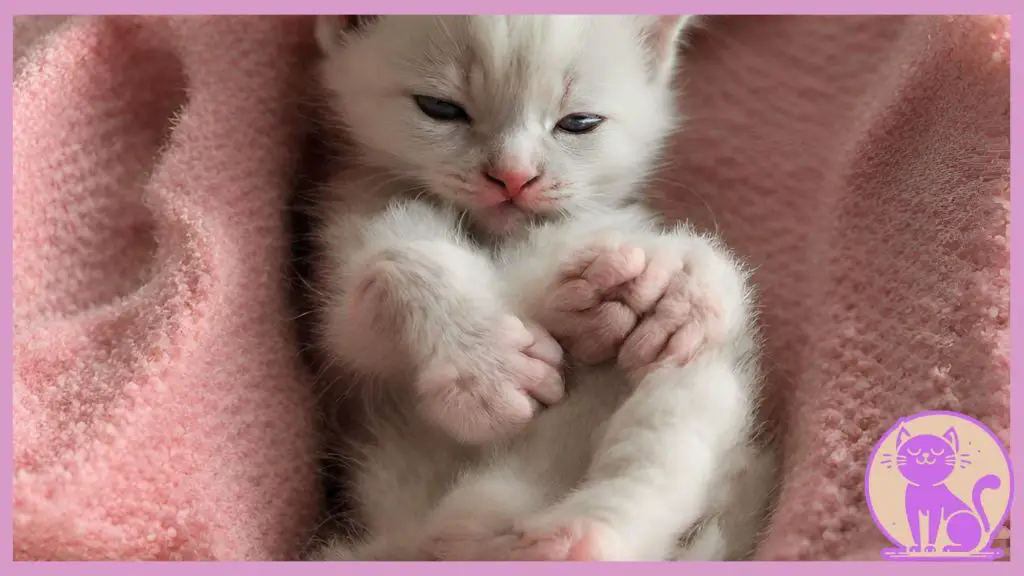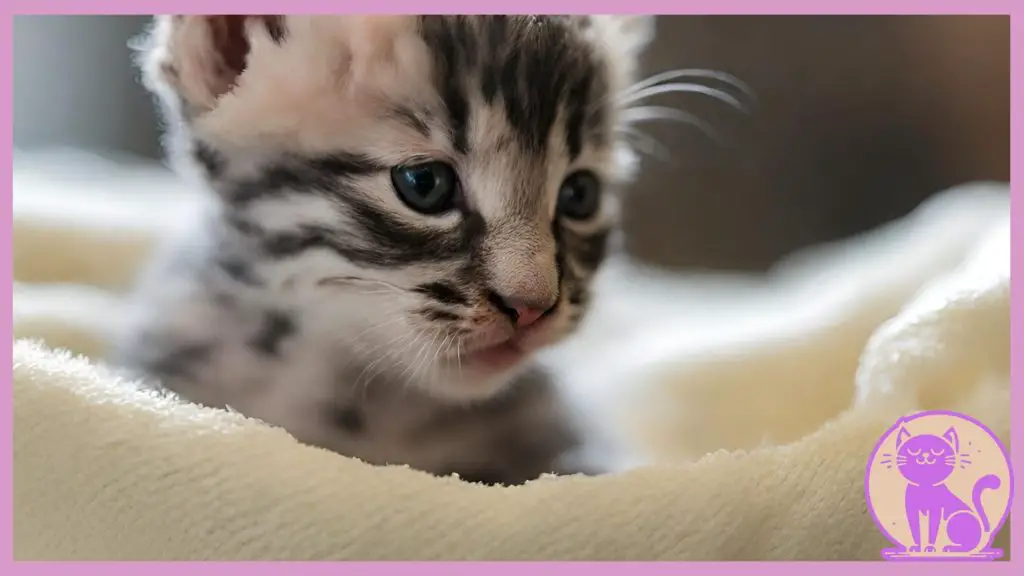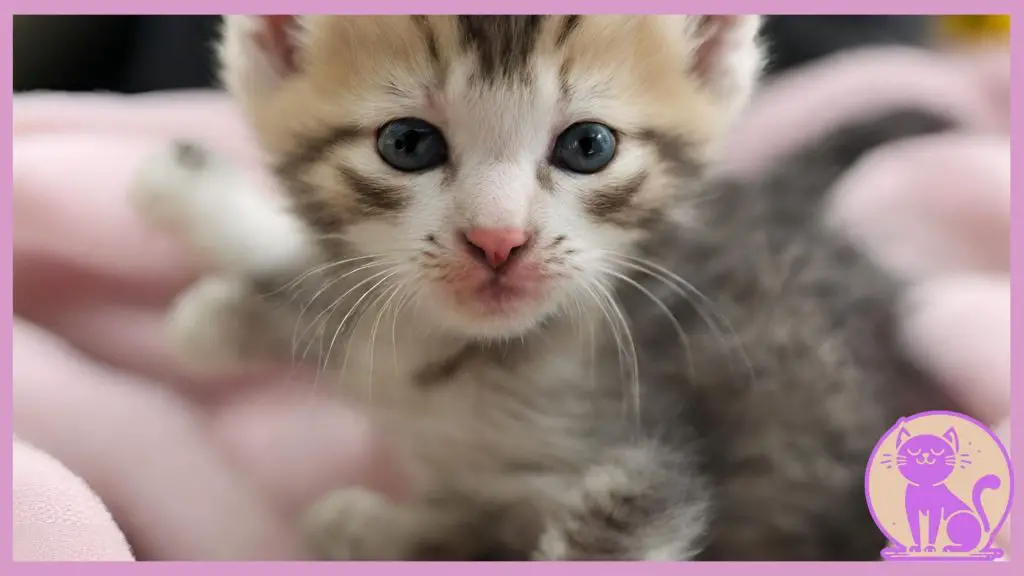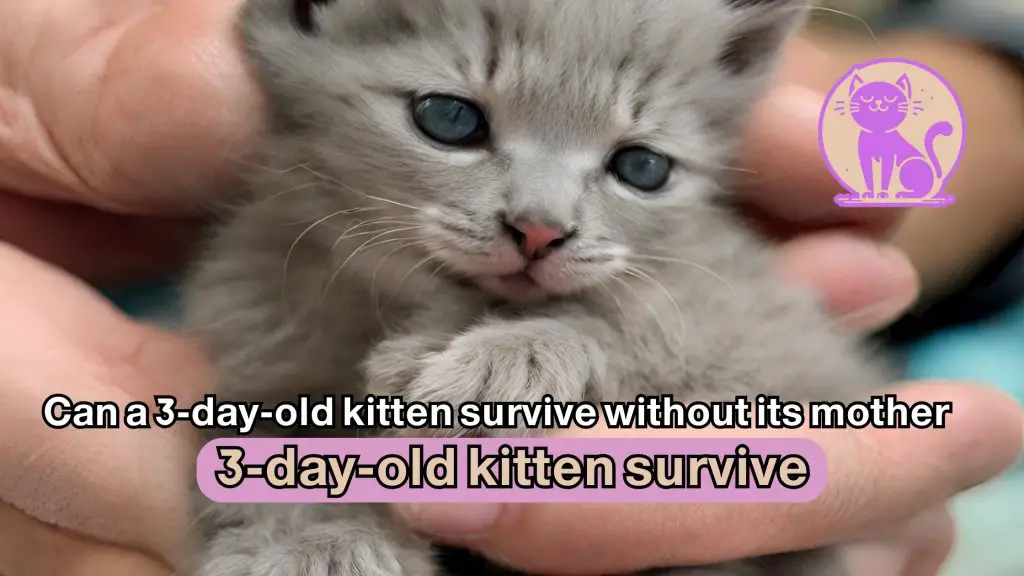Imagine a tiny, delicate creature, just three days old, left without its mother’s care. It’s a heart-wrenching thought, but one that raises an intriguing question: Can a 3-day-old kitten survive without its mother?
In this article, we will delve into the world of neonatal kitten care and explore the challenges faced by orphaned kittens. We will provide essential tips to improve their chances of survival and dive into the realm of orphaned kitten care. So, let’s discover the secrets to supporting these vulnerable little souls and unravel the possibilities that lie ahead.
The Importance of a Mother for 3 Day Old Kittens

In the early stages of a kitten’s life, the presence of a mother cat is of utmost importance. Mother’s milk plays a vital role in the health and development of 3-day-old kittens, providing them with essential nutrients and antibodies that help strengthen their immune system.
During this critical period, the mother not only nourishes her kittens but also provides them with emotional support and guidance. The bonding and interaction between a mother cat and her kittens are crucial for their social development and overall well-being.
However, in situations where kittens are orphaned or separated from their mothers, it becomes necessary for humans to step in and provide the care and support that a mother cat would typically offer.
Without a mother cat, it is essential to closely monitor the health of 3-day-old kittens and ensure their well-being. Regular health monitoring helps detect any signs of illness or distress early on, allowing for prompt intervention and appropriate medical treatment, if necessary.
By understanding the vital role of a mother cat and replicating her care to the best of our abilities, we can give orphaned 3-day-old kittens a fighting chance for a healthy and happy life.
Orphaned Kitten Care: Replacing Mother’s Milk
When caring for orphaned 3-day-old kittens, it is crucial to provide them with the proper nutrition they would normally receive from their mother’s milk. Bottle feeding becomes a vital aspect of their care to ensure their healthy growth and development. Here, we will discuss the techniques and considerations involved in bottle feeding kittens and the importance of using appropriate kitten formula.
Bottle Feeding Kittens:
- Choose a bottle specifically designed for feeding kittens. These bottles often come with smaller nipples that mimic the feel and flow of a mother’s nipple. Avoid using regular baby bottles or animal nurser bottles, as they may not meet the needs of a tiny kitten.
- Before each feeding, make sure to sterilize the bottle and nipple to maintain proper hygiene and prevent the spread of bacteria.
- Hold the bottle at a slight angle, allowing the kitten to lap up the milk rather than forcing it into their mouths. This mimics the way they would naturally nurse from their mother.
- Monitor the kitten’s feeding progress. They should be actively sucking and swallowing while feeding. If they are struggling or not feeding well, consult a veterinarian for guidance.
Kitten Formula:
When choosing a kitten formula, it is essential to select one specifically formulated for newborn and orphaned kittens. Kitten formula provides the necessary nutrients and vitamins for their growth and development. Avoid using cow’s milk or human baby formula, as they do not provide the proper balance of nutrients for kittens.
Follow the instructions on the formula packaging for the appropriate mixing ratio with water. It is crucial to mix the formula properly to ensure the correct nutrition for the kitten.
Determining the appropriate portion size can be challenging, as it depends on the kitten’s size, activity level, and individual needs. It is essential to monitor the kitten’s weight gain and consult a veterinarian for guidance on portion size adjustments.
| Age | Feeding Frequency |
|---|---|
| 1-2 weeks | Every 2-3 hours |
| 2-3 weeks | Every 3-4 hours |
| 3-4 weeks | Every 4-6 hours |
Providing Warmth and Comfort to Orphaned Kittens

When caring for orphaned kittens, it is essential to create a warm and safe environment to ensure their comfort and well-being. Newborn kittens are unable to regulate their body temperature effectively, making them vulnerable to hypothermia. The use of a kitten heating pad can be a valuable tool in providing the warmth they need.
A kitten heating pad is designed to mimic the warmth of a mother’s body, offering a cozy and comforting space for orphaned kittens. It typically comes with adjustable temperature settings to maintain a consistent and safe level of heat.
Here are some key benefits and considerations when using a kitten heating pad:
- Preventing hypothermia: Orphaned kittens are at a higher risk of developing hypothermia, which can be life-threatening. A heating pad helps maintain their body temperature at an optimal level, reducing the risk of hypothermia.
- Comfort and security: The warmth provided by the heating pad helps orphaned kittens feel secure, as it replicates the warmth they would experience when snuggling with their mother.
- Regulating heat: Kitten heating pads often come with adjustable temperature settings, allowing you to monitor and maintain a comfortable level of heat suitable for the kittens’ age and needs.
While using a kitten heating pad is beneficial, it is crucial to follow these guidelines to ensure safety:
- Always place the heating pad under a blanket or towel to avoid direct contact with the kittens’ delicate skin.
- Monitor the temperature regularly to prevent overheating. The pad should only provide gentle warmth, not excessive heat.
- Ensure there is ample space for the kittens to move away from the heating pad if they become too warm.
In addition to a kitten heating pad, you can also provide warm bedding, such as soft blankets or towels, to further enhance their comfort. Regularly check on the kittens to ensure they are neither too cold nor too hot.
Comparison of Kitten Heating Pads
Here is a comparison of some popular kitten heating pads available on the market:
| Brand | Features | Price Range |
|---|---|---|
| K&H Pet Products | Adjustable temperature settings, durable design | $20-$40 |
| Snuggle Safe | Self-heating, no electricity required | $15-$25 |
| Pet Magasin | Soft plush cover, waterproof construction | $10-$20 |
When choosing a kitten heating pad, consider factors such as safety features, ease of use, and budget. Remember, the well-being and comfort of the orphaned kittens are of the utmost importance.
Creating a Feeding Schedule for Orphaned Kittens

Establishing a consistent feeding schedule is essential for the well-being and development of 3-day-old orphaned kittens. By providing them with regular nourishment, you can ensure they receive the nutrition they need to thrive.
When creating a feeding schedule, it is important to consider their age and nutritional requirements. Here are some guidelines to help you establish a suitable routine:
- Frequency: At this young age, kittens require frequent feedings. Aim to feed them every 2 to 3 hours throughout the day and night. This mimics the natural feeding pattern they would have with their mother.
- Portion size: Use a kitten nursing bottle or syringe to provide the appropriate amount of formula. The general rule of thumb is to feed them 8 ml of milk replacement formula per ounce of body weight. However, consult with a veterinarian for precise measurements based on the specific needs of the kitten.
- Feeding technique: It’s important to ensure the kitten is positioned correctly while feeding to prevent aspiration. Hold them in an upright position, with their head slightly elevated, and allow them to suckle at their own pace.
As the kittens grow and reach around 4 weeks of age, you can gradually introduce solid food into their diet. Offer them a high-quality kitten food moistened with a small amount of warm water or kitten formula. Observe their response and adjust the consistency of the food to match their chewing ability.
Remember, each kitten is unique, and their feeding needs may vary. It is recommended to consult with a veterinarian who can provide personalized guidance based on the kitten’s health and development.
Monitoring the Health of Orphaned Kittens
In the early stages of caring for orphaned 3-day-old kittens, monitoring their health is crucial to ensure their well-being and increase their chances of survival. By being vigilant and attentive, you can catch any potential issues early on and take appropriate action.
Signs of Dehydration
Dehydration is a common concern among orphaned kittens, as they are unable to nurse from their mother. It’s important to look out for the following signs of dehydration:
- Excessive thirst
- Dry and sticky gums
- Loss of skin elasticity
- Lethargy or decreased energy
- Decreased urine output
If you notice any of these signs, it’s essential to rehydrate the kitten promptly to prevent further complications.
Rehydrating a Kitten
Rehydration is a critical step in caring for an orphaned kitten. To rehydrate a 3-day-old kitten, you can follow these steps:
- Prepare a rehydration solution by mixing a kitten-specific electrolyte formula with warm water. Follow the instructions provided by the formula manufacturer.
- Using a syringe or a specialized kitten nursing bottle, carefully feed the rehydration solution to the kitten in small amounts. Be gentle and ensure they are swallowing it properly.
- Continue offering the rehydration solution at regular intervals throughout the day, gradually increasing the amount as the kitten’s condition improves.
It’s important to monitor the kitten closely during the rehydration process and seek veterinary advice if there is no improvement or if the dehydration worsens.
Common Health Issues
Orphaned kittens are susceptible to various health issues. Some of the common health problems that may arise include:
- Respiratory infections
- Gastrointestinal issues
- Parasites
- Hypothermia
Regularly monitoring the kitten’s behavior, appetite, and overall well-being can help identify these health issues early on, allowing for prompt intervention and treatment.
A Complete Picture
Here is a table summarizing the signs of dehydration and the steps to rehydrate an orphaned kitten:
| Signs of Dehydration | Rehydrating a Kitten |
|---|---|
| – Excessive thirst | 1. Prepare a rehydration solution |
| – Dry and sticky gums | 2. Carefully feed the solution in small amounts |
| – Loss of skin elasticity | 3. Offer the solution at regular intervals |
| – Lethargy or decreased energy | |
| – Decreased urine output |
Remember, a proactive approach to monitoring the health of orphaned kittens is vital for their well-being. By recognizing signs of dehydration, addressing common health issues, and providing necessary care, you can give these tiny feline friends the best chance at a healthy and happy life.
Socializing and Fostering Orphaned Kittens

When it comes to orphaned kittens, socialization plays a vital role in their overall development and chances of finding loving homes. By providing them with a nurturing environment and following these kitten fostering tips, you can help these little ones blossom into happy and well-adjusted companions.
1. Start Early and Gradual
From a young age, expose kittens to a wide range of experiences and stimuli. Introduce them to different people, handling, and gentle play to help them build trust and confidence. Gradually increase the level of interaction and exposure as they grow, ensuring their comfort and safety throughout the process.
2. Encourage Playtime
Playtime is not just fun; it is crucial for developing their physical coordination and social skills. Provide them with age-appropriate toys and engage in interactive play sessions. Encourage them to explore their surroundings, helping them build their confidence and adaptability.
3. Socialize with Other Animals
Exposing orphaned kittens to other animals, such as well-vaccinated adult cats or calm dogs, can help them learn social cues and develop appropriate behavior. Always introduce them in a controlled and supervised environment, allowing them to interact and gradually form positive relationships.
4. Create a Safe Space
Designate a cozy and secure area where the kittens can retreat to when they need some alone time. Provide them with hiding spots, like blankets or boxes, to make them feel safe and secure. This space will also help them adjust to their new surroundings at a comfortable pace.
5. Seek Out Fosters or Adoptive Homes
While providing care for orphaned kittens, it’s essential to have a plan for finding them suitable fosters or permanent homes. Reach out to local rescue organizations, animal shelters, and potential adopters who can offer a loving environment for these little ones. Promote their stories and adorable photos on social media platforms to increase their visibility and chances of finding a forever home.
By implementing these kitten fostering tips and investing time and effort in socializing orphaned kittens, you can help them navigate their way to a bright future filled with love, companionship, and happiness.
Nurturing Orphaned Kittens for Survival
When caring for orphaned 3-day-old kittens, it is essential to provide holistic care that promotes their overall well-being. In addition to addressing their nutritional needs, you should focus on grooming, stimulation, and creating a safe play area to enhance their development and increase their chances of survival.
Grooming
Grooming plays a vital role in the health and comfort of orphaned kittens. Regular gentle brushing with a soft kitten brush not only helps to keep their coat clean and free from tangles but also stimulates blood circulation and encourages bonding. It’s important to use a brush specifically designed for kittens to avoid causing discomfort or injury.
Stimulation
Orphaned kittens require adequate mental and physical stimulation to promote their cognitive and physical development. Engage them in gentle play sessions using interactive toys that encourage exploration and exercise. These toys can include soft balls, feather teasers, and puzzle toys that dispense treats. Remember to supervise their playtime and provide a safe environment.
Creating a Safe Play Area
Designating a specific area for play and exploration is crucial for orphaned kittens. This allows them to exercise their natural instincts while ensuring they remain safe and protected. Set up a confined space with soft bedding, toys, and hiding spots to create a secure environment for them to explore and play in. Avoid exposing them to potential hazards such as sharp objects or toxic substances.
| Grooming: | Benefits: |
|---|---|
| Regular gentle brushing | Keeps coat clean and tangle-free, stimulates blood circulation, promotes bonding |
| Using kitten-friendly brush | Prevents discomfort and injury |
- Kitten brush
- Soft grooming techniques
- Bonding and trust-building
In summary, nurturing orphaned 3-day-old kittens requires attention to their grooming, providing the right stimulation, and creating a safe play area. By adopting these practices, you can optimize their overall care and give them the best chance at survival.
Conclusion
In conclusion, while it is challenging for a 3-day-old kitten to survive without its mother, there is hope. With proper care and attention, their chances of survival can be greatly improved. By providing the essential elements of nutrition, warmth, and monitoring their health, orphaned kittens can thrive and eventually find loving homes.
One of the key factors in ensuring the well-being of orphaned kittens is providing appropriate nutrition. Bottle feeding with suitable kitten formula is crucial in meeting their nutritional needs. Feeding them at regular intervals and gradually introducing solid kitten food as they grow is important for their development.
Keeping orphaned kittens warm is another vital aspect. Utilizing kitten heating pads or providing warm blankets and bedding helps in maintaining their body temperature and preventing hypothermia. This creates a comfortable and safe environment for their growth.
Monitoring the health of these vulnerable kittens is essential. Regular observation for signs of dehydration and any potential health issues is important. If dehydration occurs, rehydration techniques should be employed under the guidance of a veterinarian. With diligent care and attention, these little survivors can thrive and find their forever homes.
FAQ
Q: Can a 3 day old kitten survive without its mother?
A: Yes, a 3-day-old kitten can survive without its mother, but it requires careful care and attention. Neonatal kitten care becomes crucial in such situations. Orphaned kitten care involves providing a warm and safe environment, bottle feeding them with appropriate kitten formula, monitoring their health, and socializing them to increase their chances of survival.
Q: What is the importance of a mother for 3-day-old kittens?
A: A mother cat plays a vital role in the early stages of a kitten’s life. Her milk provides essential nutrients and antibodies that help build a strong immune system. It is necessary for healthy growth and development. Without a mother, orphaned kittens require special care techniques and substitutes for mother’s milk.
Q: How do I replace the mother’s milk for orphaned 3-day-old kittens?
A: When 3-day-old kittens are orphaned, bottle feeding becomes essential. You will need to use kitten formula specifically designed for their nutritional needs. Follow the feeding guidelines provided on the formula packaging, and feed the kittens every 2 to 4 hours. Be sure to hold them in a proper feeding position and monitor their intake.
Q: How can I provide warmth and comfort to orphaned kittens?
A: Orphaned 3-day-old kittens need a warm and safe environment to thrive. You can use a kitten heating pad or a warm water bottle wrapped in a towel to provide gentle heat. Ensure the kittens can move away from the heat source if they become too hot. Keep their bedding clean and dry to maintain their comfort.
Q: What should be the feeding schedule for orphaned kittens?
A: Establishing a consistent feeding schedule is crucial for orphaned 3-day-old kittens. Feed them every 2 to 4 hours, including during the night. As they grow, gradually increase the time between feedings. Introduce solid food around 4 to 5 weeks of age while continuing to provide formula. Monitor their response to solid food and adjust the feeding schedule accordingly.
Q: How do I monitor the health of orphaned kittens?
A: It’s important to monitor the health of orphaned 3-day-old kittens closely. Regularly check their weight, hydration levels, and body temperature. Look for signs of dehydration, such as dry gums, sunken eyes, and lack of urination. If necessary, consult a veterinarian for guidance on rehydration methods and to address any other health concerns.
Q: What are some tips for fostering orphaned kittens?
A: When fostering orphaned 3-day-old kittens, creating a nurturing environment is essential. Provide them with socialization opportunities by gently handling them and exposing them to different sights and sounds. Help them develop their social skills by introducing them to other friendly animals. Seek experienced fosters or potential adoptive homes to ensure they receive the care they need.
Q: How can I nurture orphaned kittens for survival?
A: To increase the chances of survival for 3-day-old orphaned kittens, provide daily grooming to simulate their mother’s attention. Use a warm, damp cloth or gentle brush to stimulate their digestion. Create a safe play area with appropriate toys and objects for exploration. By providing a nurturing environment, you can help them develop and thrive until they find loving homes.








